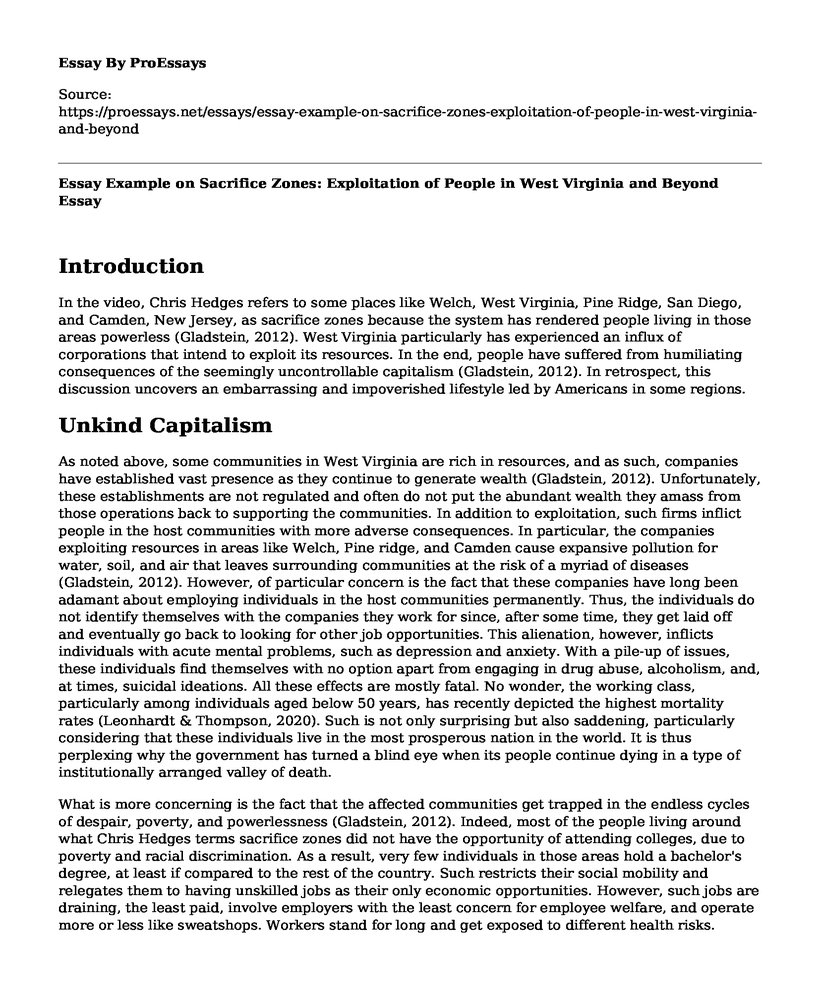Introduction
In the video, Chris Hedges refers to some places like Welch, West Virginia, Pine Ridge, San Diego, and Camden, New Jersey, as sacrifice zones because the system has rendered people living in those areas powerless (Gladstein, 2012). West Virginia particularly has experienced an influx of corporations that intend to exploit its resources. In the end, people have suffered from humiliating consequences of the seemingly uncontrollable capitalism (Gladstein, 2012). In retrospect, this discussion uncovers an embarrassing and impoverished lifestyle led by Americans in some regions.
Unkind Capitalism
As noted above, some communities in West Virginia are rich in resources, and as such, companies have established vast presence as they continue to generate wealth (Gladstein, 2012). Unfortunately, these establishments are not regulated and often do not put the abundant wealth they amass from those operations back to supporting the communities. In addition to exploitation, such firms inflict people in the host communities with more adverse consequences. In particular, the companies exploiting resources in areas like Welch, Pine ridge, and Camden cause expansive pollution for water, soil, and air that leaves surrounding communities at the risk of a myriad of diseases (Gladstein, 2012). However, of particular concern is the fact that these companies have long been adamant about employing individuals in the host communities permanently. Thus, the individuals do not identify themselves with the companies they work for since, after some time, they get laid off and eventually go back to looking for other job opportunities. This alienation, however, inflicts individuals with acute mental problems, such as depression and anxiety. With a pile-up of issues, these individuals find themselves with no option apart from engaging in drug abuse, alcoholism, and, at times, suicidal ideations. All these effects are mostly fatal. No wonder, the working class, particularly among individuals aged below 50 years, has recently depicted the highest mortality rates (Leonhardt & Thompson, 2020). Such is not only surprising but also saddening, particularly considering that these individuals live in the most prosperous nation in the world. It is thus perplexing why the government has turned a blind eye when its people continue dying in a type of institutionally arranged valley of death.
What is more concerning is the fact that the affected communities get trapped in the endless cycles of despair, poverty, and powerlessness (Gladstein, 2012). Indeed, most of the people living around what Chris Hedges terms sacrifice zones did not have the opportunity of attending colleges, due to poverty and racial discrimination. As a result, very few individuals in those areas hold a bachelor's degree, at least if compared to the rest of the country. Such restricts their social mobility and relegates them to having unskilled jobs as their only economic opportunities. However, such jobs are draining, the least paid, involve employers with the least concern for employee welfare, and operate more or less like sweatshops. Workers stand for long and get exposed to different health risks. Therefore, poverty has to remain at alarming rates in the areas dubbed as sacrifice zones. Indeed, Camden of New Jersey is arguably the most impoverished urban area in the United States (Gladstein, 2012).
Conclusion
In conclusion, exposing individuals to destitution affects more than their physical health. According to Hedges, such people suffer from significant deterioration in self-esteem and a sense of self-worth and hopelessness creeps in (Gladstein, 2012). Therefore, American society should rethink its welfare programs to rescue the victims of the unregulated capitalism from poverty, as under the current situation, their future generations are also in jeopardy.
References
Gladstein, N. (August 13, 2012). Capitalism's 'sacrifice zones.' Youtube. https://www.youtube.com/watch?v=G-49tKzXe2Y&list=PLfhh1ihnlKZUtrDa8CqHmi7VZ6K9XzDCj&index=10&t=278s
Leonhardt, D., & Thompson, S.A. (March 6, 2020). How working-class life is killing Americans, in charts. New York Times. https://www.nytimes.com/interactive/2020/03/06/opinion/working-class-death-rate.html
Cite this page
Essay Example on Sacrifice Zones: Exploitation of People in West Virginia and Beyond. (2023, Apr 23). Retrieved from https://proessays.net/essays/essay-example-on-sacrifice-zones-exploitation-of-people-in-west-virginia-and-beyond
If you are the original author of this essay and no longer wish to have it published on the ProEssays website, please click below to request its removal:
- Managing Exchange Rate Risk Through Hedging - Paper on Finance and Investments
- Essay on Current Economic Events and How It Relates to the Principle of Macroeconomic
- Salary Gap for Females in the Media Industry Essay Example
- Motivating Professionals: Expectancy Theory & Similarities - Essay Sample
- Foreign Languages Research Proposal: A Key Bridge for Cultural Understanding in an Increasingly Globalized World
- U.S. Jobs Record Streak: African Americans Fare Worse - Essay Sample
- Essay Example on Unions' Strikes: A Visual Journey







